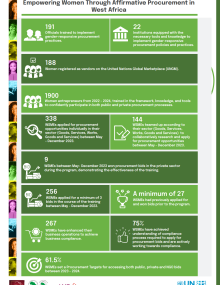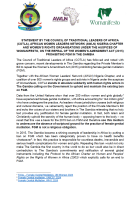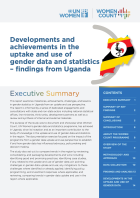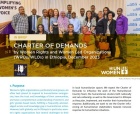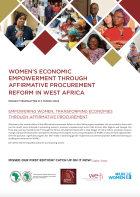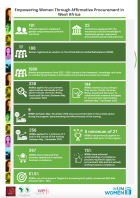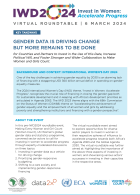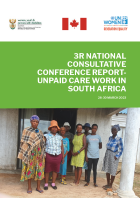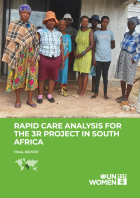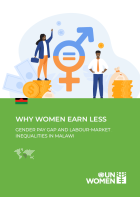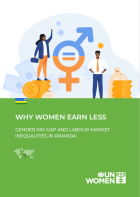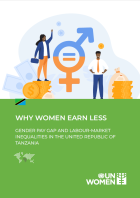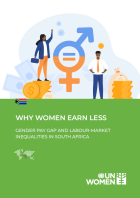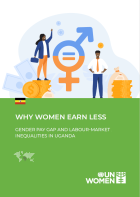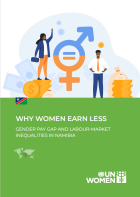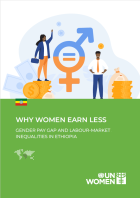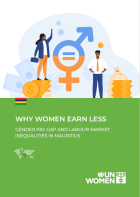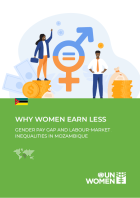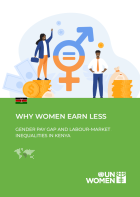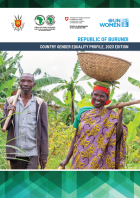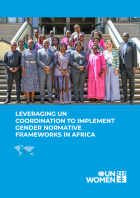Date:
STATEMENT BY THE COUNCIL OF TRADITIONAL LEADERS OF AFRICA
(COTLA), AFRICAN WOMEN LEADERS NETWORK (AWLN) NIGERIA CHAPTER
AND WOMEN’S RIGHTS ORGANISATIONS UNDER THE AUSPICES OF
WOMANIFESTO, ON THE REPEAL OF THE WOMEN’S AMENDMENT ACT (2015)
PROHIBITING FGM IN THE GAMBIA.
Date:
Uganda has demonstrated thought leadership in the use of administrative and citizen data for statistical purposes in its efforts to meet national priorities and address gaps towards achieving the Third National Development Plan (NDPIII) and SDG targets including on gender equality and women’s empowerment. This product highlights some of the achievements and lessons in improving the quality and use of this data to improve the lives of women and girls.
Date:
The purpose of this Charter of Demand is to provide a tool for women led and women’s rights organizations to make their voices and demands heard.
Date:
Discover the impact of the Affirmative Procurement Reform in West Africa project in empowering women entrepreneurs across Côte d’Ivoire, Mali, Nigeria, and Senegal. This newsletter showcases policy reforms, capacity-building initiatives, and success stories aimed at enhancing women's participation in procurement.
Date:
Explore the strides made in empowering women entrepreneurs in West Africa through the Affirmative Procurement project. These fact sheets provide an in-depth look into progress made in Côte d’Ivoire, Mali, Nigeria, and Senegal highlighting initiatives aimed at supporting Women-owned/led Small and Medium Enterprises (WSMEs) within the procurement landscape.
Date:
In this pre-IWD2024 roundtable event, Making Every Woman and Girl Count (Women Count), UN Women’s global gender data and statistics programme, convened sector actors to call for investing in women to accelerate progress through moderated discussions on: investing in gender data as a vehicle for driving change; prioritizing gender-responsive budgeting; shifting to a care society and implementing gender-responsive financing. The UN Economic Commission for Africa and the African Development Bank (AfDB) provided continental perspectives while global gender data alliance Data 2X provided a global view of the status of investment in gender data and its importance for gender equality and women's empowerment (GEWE).
Date:
The national consultative Conference was held under the theme, “Collective Action to Recognise, Reduce and Redistribute unpaid work in South Africa - the 3R Framework.”
Date:
The Rapid Care Analysis (RCA) was conducted to better understand factors influencing the nature of unpaid care work, distribution among women, men, boys, and girls, and unpaid care work interventions in South Africa.
Date:
The objective of the present study is to present an overview of the adjusted gender pay gap and labour-market inequalities in Malawi. This is part of a larger 2023 UN Women study titled “Why Women Earn Less: Gender Pay Gap and Labour-Market Inequalities in East and Southern Africa.”
Date:
The objective of the present study is to present an overview of the adjusted gender pay gap and labour-market inequalities in Rwanda. This is part of a larger 2023 UN Women study titled “Why Women Earn Less: Gender Pay Gap and Labour-Market Inequalities in East and Southern Africa.”
Date:
The objective of the present study is to present an overview of the adjusted gender pay gap and labour-market inequalities in The United Republic of Tanzania. This is part of a larger 2023 UN Women study titled “Why Women Earn Less: Gender Pay Gap and Labour-Market Inequalities in East and Southern Africa.”
Date:
The objective of the present study is to present an overview of the adjusted gender pay gap and labour-market inequalities in South Africa. This is part of a larger 2023 UN Women study titled “Why Women Earn Less: Gender Pay Gap and Labour-Market Inequalities in East and Southern Africa.”
Date:
The objective of the present study is to present an overview of the adjusted gender pay gap and labour-market inequalities in Uganda. This is part of a larger 2023 UN Women study titled “Why Women Earn Less: Gender Pay Gap and Labour-Market Inequalities in East and Southern Africa.”
Date:
The objective of the present study is to present an overview of the adjusted gender pay gap and labour-market inequalities in Namibia. This is part of a larger 2023 UN Women study titled “Why Women Earn Less: Gender Pay Gap and Labour-Market Inequalities in East and Southern Africa.”
Date:
The objective of the present study is to present an overview of the adjusted gender pay gap and labour-market inequalities in Ethiopia. This is part of a larger 2023 UN Women study titled “Why Women Earn Less: Gender Pay Gap and Labour-Market Inequalities in East and Southern Africa.”
Date:
The objective of the present study is to present an overview of the adjusted gender pay gap and labour-market inequalities in Mauritius. This is part of a larger 2023 UN Women study titled “Why Women Earn Less: Gender Pay Gap and Labour-Market Inequalities in East and Southern Africa.”
Date:
The objective of the present study is to present an overview of the adjusted gender pay gap and labour-market inequalities in Mozambique. This is part of a larger 2023 UN Women study titled “Why Women Earn Less: Gender Pay Gap and Labour-Market Inequalities in East and Southern Africa.”
Date:
The objective of the present study is to present an overview of the adjusted gender pay gap and labour-market inequalities in Kenya. This is part of a larger 2023 UN Women study titled “Why Women Earn Less: Gender Pay Gap and Labour-Market Inequalities in East and Southern Africa.”
Date:
The Burundi Country Gender Equality Profile (CGEP), 2023 edition scans the horizons and outlines the prospects for gender equality in Burundi with a view to creating an overview and establishing a baseline on the situation of Gender Equality in the country.
Date:
UN Women East and Southern Africa regional office organised a high-level United Nations Inter-Agency Partnership meeting on Gender Normative Work in February 2024. The overall objective of the meeting was to develop & improve regional partnerships for a more effective implementation of the United Nations' Normative commitments on Gender Equality in Africa.
